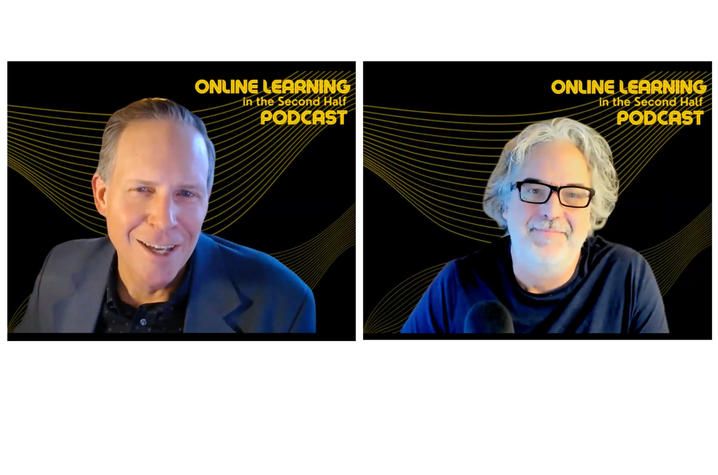UK duo close Johns Hopkins online teaching symposium with podcast session

LEXINGTON, Ky. (April 1, 2024) — University of Kentucky College of Education Associate Professor John Nash, Ph.D., and Jason Johnston, Ph.D., hosts of the Online Learning in the Second Half podcast, facilitated a conversation about the future of online learning during a recent Johns Hopkins University symposium. The session is now available as a podcast episode for listening online.
Nash is an associate professor of educational leadership studies and director of the Laboratory on Design Thinking at the UK College of Education. Johnston was Nash’s doctoral student and earned his Ph.D. from the Department of Educational Leadership Studies in 2021. He is the executive director of online learning and course production at the University of Tennessee.
The podcast episode was recorded during the closing session of the inaugural Johns Hopkins Center for Teaching Excellence and Innovation virtual symposium, themed Excellence in Online Teaching. It featured sessions from experts who have been involved in online education at Johns Hopkins and beyond.
Nash and Johnston’s session, “Humanizing Online Learning: A Podcast Conversation,” was an interactive and participatory discussion.
"John Nash and Jason Johnston synthesized key insights from the symposium’s sessions and invited attendees to share their own experiences and perspectives on how to make online learning more engaging and inclusive. It was a nice way to share key messages from the symposium even more widely, by recording and publishing a podcast from the event,” said Olysha Magruder, Ed.D., interim assistant dean, Learning Design and Innovation, Center for Learning Design and Technology at Johns Hopkins Whiting School of Engineering.
Nash and Johnston think online learning had its chance to become good, but there’s a chance to be even better. The future extends beyond technology and innovation. Treating humans as individuals is a first step to improving the online learning experience, the hosts said.
“Making online learning human-centric touches all parts of the learning space – the interactions between students, the way we structure our courses, how we grade our assignments, what instructors share about themselves and so on,” Johnston said. “We move beyond the course’s content when we show up as our authentic selves.”
Podcast participants recalled ways the symposium’s speakers had sparked ideas for creating a stronger human connection in online courses – showing photos and telling stories, sharing what drives their interest in the work and empowering students to do the same.
“Online courses are not content. They are experiences. And to create a great experience, we must thread in all these other things with intention. This creates great active experiences on the learning side as the learner goes through the journey,” Nash said.
The podcast episode synthesizing the Johns Hopkins symposium is among two dozen episodes posted so far. Nash said he and Johnston started the podcast to share their passion and expertise in online learning with a wider audience.
“We wanted to create a platform where we could explore the challenges and opportunities of online learning and showcase the best practices and innovations from various disciplines and contexts. We also wanted to have fun and learn from each other, as well as from our guests and listeners.”
The podcast, which can be accessed at OnlineLearningPodcast.com, covers a wide range of topics related to online learning, such as pedagogical case studies, edtech innovations, teaching best practices and policy issues drawing on interviews with experts from various fields, such as cognitive psychology, data science, instructional design and more.
“We were thrilled to have this opportunity to share our passion and expertise in online learning with the Johns Hopkins community and beyond. We hope the conversation will inspire and inform listeners of our podcast,” Nash said.
As the state’s flagship, land-grant institution, the University of Kentucky exists to advance the Commonwealth. We do that by preparing the next generation of leaders — placing students at the heart of everything we do — and transforming the lives of Kentuckians through education, research and creative work, service and health care. We pride ourselves on being a catalyst for breakthroughs and a force for healing, a place where ingenuity unfolds. It's all made possible by our people — visionaries, disruptors and pioneers — who make up 200 academic programs, a $476.5 million research and development enterprise and a world-class medical center, all on one campus.




